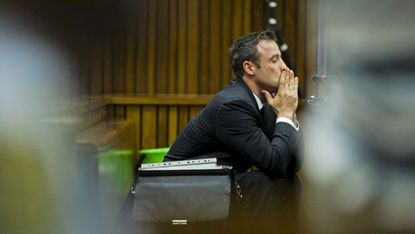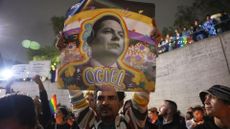The Pistorius defence: fear of crime - or is it really racism?
White South Africans fear violent crime – but it occurs in townships not gated communities, says Pierre de Vos

THE WEEK has not begun well for Oscar Pistorius. Under relentless cross-examination from prosecutor Gerrie Nel, the Paralympian athlete, standing trial for shooting and killing his girlfriend, Reeva Steenkamp, came across as an evasive witness.
Pistorius first told the court he had “accidentally discharged” his firearm, then he said he acted out of fear because he thought his life was in danger, and then he said he did not mean to pull the trigger. Only the second of these claims provides a plausible legal defence.
Because there was no actual threat to Pistorius's life, he cannot rely on the principle of self-defence. However, in South African law, the principle of putative self-defence may apply where the accused genuinely believed his or her life was threatened.
Subscribe to The Week
Escape your echo chamber. Get the facts behind the news, plus analysis from multiple perspectives.

Sign up for The Week's Free Newsletters
From our morning news briefing to a weekly Good News Newsletter, get the best of The Week delivered directly to your inbox.
From our morning news briefing to a weekly Good News Newsletter, get the best of The Week delivered directly to your inbox.
Where an accused is found to have genuinely believed their life was in danger and that they was using reasonable means to avert an attack on themselves or their property, they may escape conviction for murder on the grounds that they lacked requisite intention.
Pistorius therefore has to convince the court that his vulnerability, as a disabled person living in South Africa, genuinely led him to believe his life was in danger from an intruder hiding behind a closed toilet door. The court must further be convinced that his response – pumping four bullets through the door – was reasonable in the circumstances.
For a person living outside South Africa, this may seem a tough ask. It may not seem remotely reasonable to shoot four “zombie-stopper” bullets into a door without having been directly threatened by an attacker and without knowing who was hiding behind it.
However, at the heart of the defence is an assumption that the high crime rate in South Africa, coupled with Pistorius’s vulnerable state as a disabled person, rendered his actions reasonable.
Life of crime
It is true that the rate of violent crime in South Africa is high. Although the murder rate has decreased substantially from 68.1 murders per 100,000 people in 1995/1996 to 30.3 per 100,000 in 2011/2012, this number remains extremely high. But statistics from different police stations also indicate that violent crime is far more rife in black townships than in the middle class areas where most white people live.
Pistorius lived in one of the many gated communities which have sprung up in response to the perceived threat of violent crime against middle class people. Often built in an identical faux-Tuscan style, houses in such communities are usually also kitted out with an elaborate alarm system, as was Pistorius's. Such communities are typically surrounded by a high wall with an electric fence on top; the entrance to the community is always strictly controlled.
It was exactly because Pistorius lived in a gated community that he could sleep with the windows of his bedroom open. That he lived in such a place therefore presents a major difficulty for the defence. Most middle-class South Africans not living in such communities perform elaborate rituals at night to lock doors and security gates, and to activate alarm systems linked to the offices of private security companies on 24-hour call in the event of the alarm being tripped.
The obsession with violent crime displayed by some middle-class white people in South Africa, usually in fearful discussions at dinner parties and on radio talk shows, has become something of a cliché. It is made fun of by comedians and those wishing to display their enthusiastic support for the so-called “new South Africa”.
Fear or racism?
This fear became prominent around the time when South Africa made the transition from white minority rule to democracy. When white South Africans express an acute fear of violent crime, it can often sound like fear of crime has become a more acceptable way for white people to express their fear of black people and of a government led by black people.
Pistorius needs to convince the court that his alleged fear of an intruder was not irrational and that his response to this alleged fear was reasonable. That is why he has alleged that he himself has on several occasions been the victim of crime.
Because he lived in a relatively safe gated community, the only possible way Pistorius could plausibly claim to have been as fearful as he said he was would be to show that because of his disability he felt especially vulnerable. In effect, he is asking the court not to treat him as a reasonable able-bodied person, but as a reasonable disabled person.
Pierre de Vos is the Cluade Leon Foundation Chair in Constitutional Governance at the University of Cape Town. This article was originally published on The Conversation.

Continue reading for free
We hope you're enjoying The Week's refreshingly open-minded journalism.
Subscribed to The Week? Register your account with the same email as your subscription.
Sign up to our 10 Things You Need to Know Today newsletter
A free daily digest of the biggest news stories of the day - and the best features from our website
-
 6 tips to shop online safely this holiday season
6 tips to shop online safely this holiday seasonThe Explainer Lower the chances of credit card fraud spoiling your holidays
By Becca Stanek, The Week US Published
-
 The daily gossip: Anya Taylor-Joy leads epic 'Furiosa' trailer, Felicity Huffman felt she 'had to break the law' in college admissions scandal, and more
The daily gossip: Anya Taylor-Joy leads epic 'Furiosa' trailer, Felicity Huffman felt she 'had to break the law' in college admissions scandal, and moreThe daily gossip: December 1, 2023
By Brendan Morrow, The Week US Published
-
 What's Qatar's role in the Middle East conflict?
What's Qatar's role in the Middle East conflict?Today's Big Question Doha hosts both Hamas and a U.S. military base. That puts it at the center of the conflict in Gaza.
By Joel Mathis, The Week US Published
-
 Oscar Pistorius: what his life will be like after prison
Oscar Pistorius: what his life will be like after prisonWhy everyone's talking about Former sprinter granted parole a decade after killing girlfriend Reeva Steenkamp
By Keumars Afifi-Sabet, The Week UK Published
-
 Death of first non-binary judge in Mexico instils fear in LGBTQ+ community
Death of first non-binary judge in Mexico instils fear in LGBTQ+ communityUnder the Radar Jesús Ociel Baena's suspected murder reveals dangers to transgender and non-binary people
By Harriet Marsden, The Week UK Published
-
 Lukoil: third top executive dies suddenly at company that criticised Putin's war
Lukoil: third top executive dies suddenly at company that criticised Putin's warSpeed Read The oil giant said its chairman Vladimir Nekrasov died of 'acute heart failure'
By Richard Windsor, The Week UK Published
-
 Belgian police shoot dead man in search for Brussels terror suspect
Belgian police shoot dead man in search for Brussels terror suspectSpeed Read The man is suspected of killing two Swedish nationals and wounding another in shooting spree
By The Week Staff Published
-
 Gangs, guns and bombs: Sweden's 'crisis of violence'
Gangs, guns and bombs: Sweden's 'crisis of violence'Why Everyone's Talking About Surge in bomb attacks and gun violence has led government to call on military support
By The Week Staff Published
-
 Dodgy cash disguised as sandwiches
Dodgy cash disguised as sandwichesTall Tales And other stories from the stranger side of life
By Chas Newkey-Burden Published
-
 Argentinian police arrest biggest online distributor of Nazi propaganda
Argentinian police arrest biggest online distributor of Nazi propagandaSpeed Reads Officials seized hundreds of texts glorifying Adolf Hitler, denying Holocaust and bearing swastikas
By Harriet Marsden Published
-
 How North Korean hackers stole billions in crypto
How North Korean hackers stole billions in cryptoSpeed Read Pyongyang-backed cyber gangs use ‘mixers’ to launder their criminal proceeds
By Chas Newkey-Burden Published











